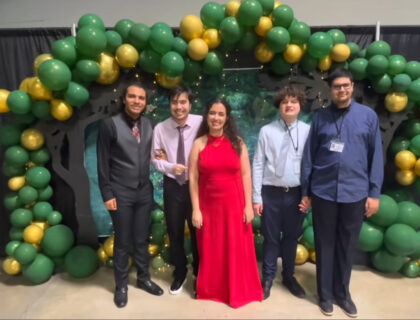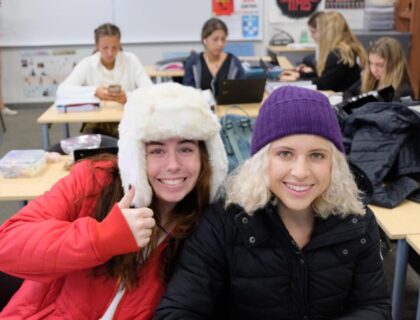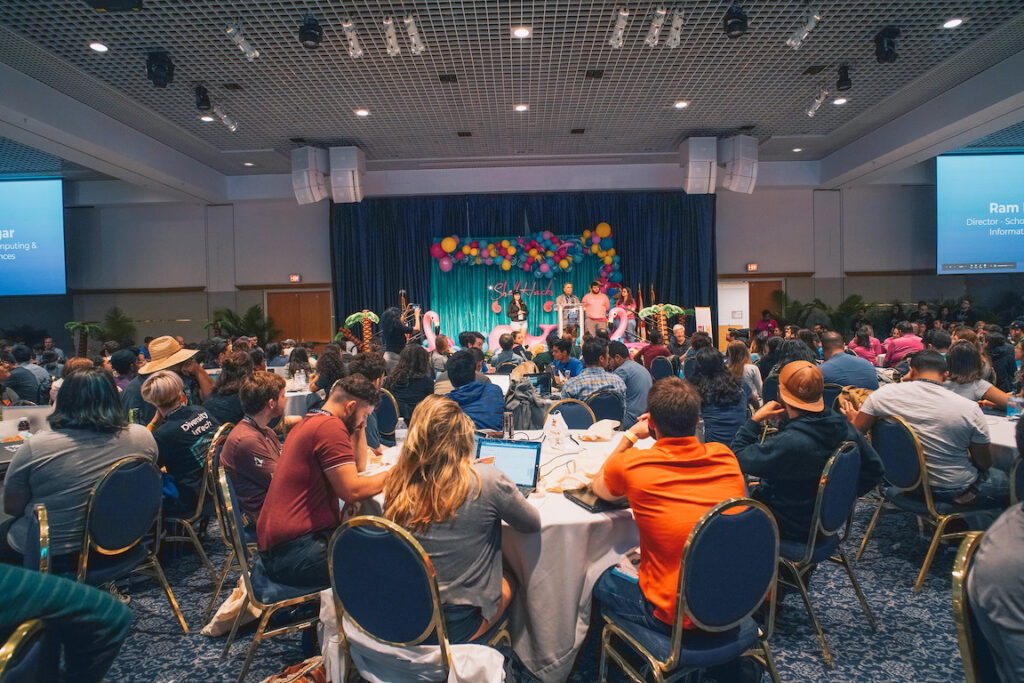FIU’s Hackathon: Cultivating Innovation in the Tech Community
The Miami Computer Science Teacher Association hosted its annual exposition event on December 9th, where computer enthusiasts, students, and educators came together and exchanged ideas. The event was held at the Florida International University’s Modesto A. Maidique Campus from 7 AM to 5 p.m. The occasion gave exhibitors in the education technology industry the opportunity to share their products with their key audience, as well as giving signed-up students the opportunity to compete with each other in a hackathon, a collaborative contest where teams have a time frame to build a certain program on the computer.
The day began with a speech from Mr. Willy Orozco, who serves as the president of the Computer Science Teacher Association.
“We need teachers to teach students how to learn beyond the classroom,” said the executive, highlighting the crucial role of technology teachers across the entire country. He emphasizes the significance of computer literacy in today’s constantly evolving classrooms.
As the day continued, competing teams in the hackathon were guided to a meeting space where they collaborated. A hackathon refers to a type of contest where teams representing a school or organization compete with each other to build a specific program based on a prompt, all in a certain time frame. The scoring system is based on a rubric that measures quality, reliability, visual appeal, team organization, and more. For this occasion, the Computer Science Honor Society at Ferguson sent two teams composed of five members each to compete in the Game Development and Web Design branches of the competition.
The challenge presented to the Web Design division was to develop a website that informed its visitors about the dangers of phishing, a common social engineering tactic used by hackers to steal individuals’ credentials. On the other hand, the Game Development division was tasked with the creation of an interactive game that fomented awareness of computer viruses and malware. Both challenges were revealed to the competitors on Monday, five days before the event. This enabled Ferguson’s teams to plan and build their program appropriately.
“It is a very connecting experience. You get to know people you see every day but don’t even talk to.” Senior student and team member of the Web Division, Ramon Gonzalez, says. “We all shared our knowledge in this hot pot.”
A panel of judges composed of guest speaker Nikita Vidal, UN advisory board member Parham Antonio Vasaiely, and others provided real-time feedback on competitors’ presentations of their entries to the contest. They also held a brief Q&A session where the participants had to clarify certain aspects of their creation to the adults. Overall, the panel of experts judged other’s work positively, citing Ferguson’s team as mature and industry-ready.
In addition to the hackathon, there was a vast space for exhibitors to set up stands to share their innovations and products with the attendees. Universities with highly valued computer science major programs, such as Northeastern University gave out freebies such as lanyards and information about their admission process. Several startups, such as Robohood, a creative robotics company, displayed their robot arm painter at the exhibition. Institute Alterna, a student-run organization headquartered in Ferguson was also present, promoting their volunteer program to students.
Numerous workshops were also held for students and teachers alike. Event sponsor Miami EdTech held a talk aimed at teachers about the integration of Artificial Intelligence into the classrooms; a topic highly debatable by teachers and members of the community. Hoverboard creator Max Ringelheim held a workshop for students, in which they explored concepts of entrepreneurship, and learned about Ringelheim’s creations’ “overnight successes” and “sudden failures”. Ferguson’s Institute Alterna also held an interactive class on the fundamentals of the Scratch programming language.
During the closing reception, Willy Orozco, the president of CSTA, announced the winners of the hackathon. The Game Development team from Ferguson won second place and received a cash prize of $500! The winning team was awarded a cash prize of $750, along with a large scholarship for an upcoming AI Bootcamp. All winners also obtained memberships that enabled access to Erudyte’s programming learning platform, along with a rewarding round of applause.
The attendants were thrilled to have the chance to explore a wide range of opportunities that were both educational and entertaining. Engaging in workshops enabled them to gain valuable knowledge and learn new skills in a fun and interactive way. Additionally, they were able to network and talk with experts in their fields, and like-minded individuals, while exchanging ideas with peers.
Events like these prove their relevance for the student body because they provide a way for learners to showcase their skills and creative approaches in a competitive environment. Hackathons challenge students to think critically, work collaboratively, and apply their knowledge in practical ways. They also provide an opportunity for students to network with professionals, gain exposure to emerging technologies, and learn more about potential career paths.
You may be interested
Farewell From the 2024-25 Editor-in-Chief
Kat Torres - May 29, 2025Finding the words to express how I truly feel has been more difficult than I expected. How do you begin to say goodbye…

The Heart and Soul of Our School
Daniella Prieto - May 29, 2025At John A. Ferguson, some of the most meaningful work is happening quietly, all through structure, patience, and consistency. Inside the ASD (Autism…

Chick-fil-A vs. Raising Cane’s: A Clash of Chicken Titans
Kristen Almendral - May 27, 2025There have been debates recently over two fast food chains: Chick-fil-A and Raising Cane’s. Both chains are favorites among many. These fast-food chains…
Most from this category

Exciting Summer Getaway Destinations
Tehreem Chaudhry - May 22, 2025
The Chilly Challenge of the Ferguson Classroom
Leydi Morales - May 20, 2025
















